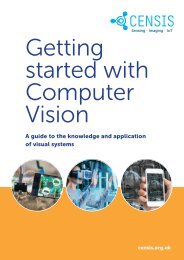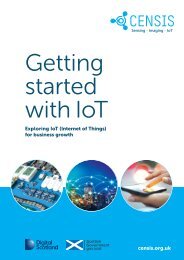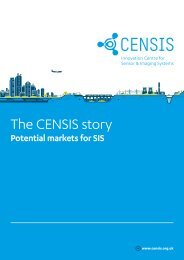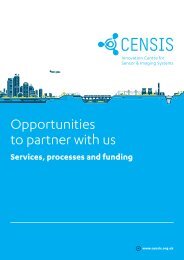CENSIS white paper: Intellectual Property in Business
2023: This CENSIS white paper sets out to make the topic of IP more approachable, less intimidating and more manageable, offering experience-based advice and methods are are designed to help businesses structure their IP- related issues and makes the best of their IP. Covering: The role of IP, IP management during growth, IP strategy for expanding companies and corporates, Business IP Canvas - merging IP with your business model.
2023: This CENSIS white paper sets out to make the topic of IP more approachable, less intimidating and more manageable, offering experience-based advice and methods are are designed to help businesses structure their IP- related issues and makes the best of their IP.
Covering:
The role of IP, IP management during growth, IP strategy for expanding companies and corporates, Business IP Canvas - merging IP with your business model.
You also want an ePaper? Increase the reach of your titles
YUMPU automatically turns print PDFs into web optimized ePapers that Google loves.
<strong>Intellectual</strong> <strong>Property</strong> <strong>in</strong> Bus<strong>in</strong>ess: IP basics, IP management, IP strategy<br />
IP Basics for Start-ups<br />
1 The role of IP <strong>in</strong> a bus<strong>in</strong>ess<br />
The term ‘<strong>in</strong>tellectual property’ (IP) refers, <strong>in</strong> a broad<br />
sense, to <strong>in</strong>tangible creations of the human <strong>in</strong>tellect.<br />
A collection of codified laws, called IP rights, provides<br />
rules that govern rights <strong>in</strong> these assets and seeks to<br />
give a fair reward for creators to <strong>in</strong>centivise <strong>in</strong>novation,<br />
without unduly restrict<strong>in</strong>g competition <strong>in</strong> the<br />
marketplace.<br />
IP rights <strong>in</strong>clude:<br />
• registered rights such as patents, registered trade<br />
marks, and registered designs (known as design<br />
patents <strong>in</strong> the USA), and<br />
• unregistered rights such as copyright and<br />
unregistered design rights.<br />
From a legal po<strong>in</strong>t of view, IP rights are legal<br />
<strong>in</strong>struments that provide some limited exclusive rights<br />
to prevent others from exploit<strong>in</strong>g the protected IP.<br />
These rights can, <strong>in</strong> effect, create a legal space that<br />
belongs only to the owner of the IP rights and provide<br />
that owner with a right to block third parties from us<strong>in</strong>g<br />
the protected idea without authorisation (through a<br />
licence). 3 The effect of these IP rights is to carve out<br />
a niche that can be accessed only with the owner’s<br />
approval.<br />
In the early stages of build<strong>in</strong>g your bus<strong>in</strong>ess, own<strong>in</strong>g<br />
IP rights can dramatically improve your negotiat<strong>in</strong>g<br />
power and the perception of your bus<strong>in</strong>ess as a<br />
credible partner. As well as provid<strong>in</strong>g legal protection,<br />
they can demonstrate your R&D <strong>in</strong>vestment and<br />
prowess, technological capacity, high level of expertise,<br />
<strong>in</strong>novative approach and commercial awareness.<br />
Present<strong>in</strong>g this positive image can strengthen your hand<br />
when you are negotiat<strong>in</strong>g with <strong>in</strong>vestors or creditors,<br />
rais<strong>in</strong>g funds and <strong>in</strong>creas<strong>in</strong>g your market value. When a<br />
company takes its IP position seriously, its competitors,<br />
partners and customers are very likely to take that IP<br />
position – and by extension the company – seriously as<br />
well. A study of more than 2,000 European small and<br />
medium sized companies found that ‘value and image’<br />
was the third most important reason for protect<strong>in</strong>g IP. 4<br />
In addition, IP can help you attract higher-quality<br />
partners because your own IP protection can protect<br />
your bus<strong>in</strong>ess partners as well (see the section on<br />
Supply cha<strong>in</strong> and IP).<br />
Regardless of your personal views on IP rights, the<br />
fact is that IP rights matter – and they matter a lot. For<br />
example, when you pitch to <strong>in</strong>vestors, it will not be<br />
long before they ask you about your IP. They will want<br />
you to protect your technology with IP rights, among<br />
which patents stand out most prom<strong>in</strong>ently. Investors<br />
recognise value and usability <strong>in</strong> IP rights because hav<strong>in</strong>g<br />
IP protection for the most crucial and/or recognisable<br />
aspects of your offer<strong>in</strong>g <strong>in</strong>creases the value of your<br />
bus<strong>in</strong>ess. In addition to that, IP rights offer a good basis<br />
for scal<strong>in</strong>g up a bus<strong>in</strong>ess – someth<strong>in</strong>g most <strong>in</strong>vestors<br />
will want to hear about.<br />
Another reason why IP rights matter is that unlike<br />
material or hard assets, they do not wear out or lose<br />
value through use. On the contrary, they ga<strong>in</strong> <strong>in</strong> value.<br />
A bus<strong>in</strong>ess can generate a revenue stream through<br />
licens<strong>in</strong>g IP to third parties (this model applies to all<br />
k<strong>in</strong>ds of IP rights). And even if the company itself does<br />
not perform well, good <strong>in</strong>ventions protected by good<br />
patents are always valuable and saleable – and for<br />
<strong>in</strong>vestors, that matters.<br />
3<br />
Every agreement that covers exploitation of the technology (by manufactur<strong>in</strong>g, sell<strong>in</strong>g, export<strong>in</strong>g, etc.) <strong>in</strong>cludes a list of IP rights that def<strong>in</strong>es the technology<br />
at stake. This usually appears <strong>in</strong> an annex at the end of the agreement.<br />
4<br />
‘5 reasons why <strong>in</strong>vestors love <strong>in</strong>tellectual property’<br />
(EU Startups, 8 January 2018) accessed 2 December 2022.<br />
9

















